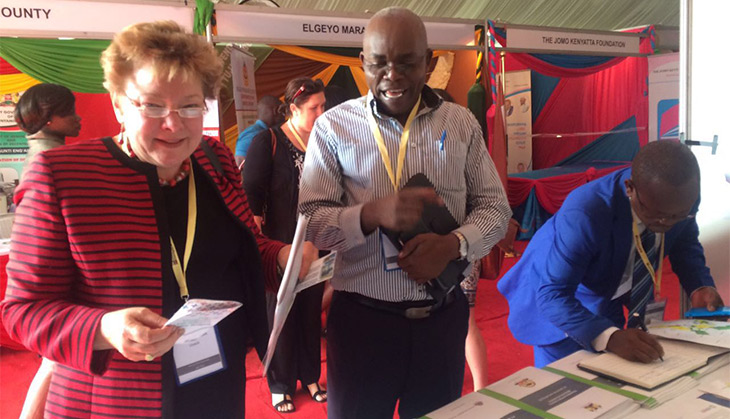The Health Policy Project ended in 2016. Work continued under Health Policy Plus (HP+) until 2022.
NEWS & VIEWS

Ms. Karen Freeman, USAID/Kenya & East Africa Mission Director, and Dhim Nzoya, USAID/Kenya & East Africa, praise HPP for their work with county leaders to improve the health sector. Photo by Health Policy Project.
New, accessible advocacy tool is helping Kenya’s county health leadership better engage in the local budget process and advocate for increased resources for health.
NAIROBI—In 2013, Kenya began decentralizing its government, devolving authority from the central government out to 47 newly-created counties. For Kenya’s county leaders, this has meant—among other things—the need for a quick education on navigating the intricate process through which funds are allocated to support county-level health services.
The budget process is guided by the Public Finance Management Act of 2012, a policy consistently perceived by county health leadership as overly complex. This has constrained the capacity of county leaders to fully engage in budget development and their ability to influence allocation of scarce health funds.
In 2015, the Health Policy Project (HPP) responded to this challenge by developing an easy-to-read, user-friendly summary of the budget cycle and opportunities for the county leaders to influence the process to secure increased health funds for their counties.
The brochure was piloted during an HPP-supported advocates training in December 2015 and during a program-based budgeting training held in February and March 2016. Previous to the trainings, a significant number of the participants were unaware of critical milestones in the budget process that affect counties’ ability to secure health funds. Japheth Omwenga, the Kisumu County Health Administrative Officer who participated in one of the trainings commented, “Information on the county budget cycle made us aware of [the] type of information required and [the] corresponding timelines to facilitate budgeting; It therefore [has] made it easier for us to plan and collect budget information from the sub-county and lower-level health facilities in good time in order to meet deadlines set by the county treasury.”
The finalized brochure was disseminated during Kenya’s third Devolution Conference held in April 2016. Ms. Karen Freeman, USAID/ Kenya & East Africa Mission Director, who participated in the conference, praised the advocacy tool: “This one, [I] am excited about because I think it is a great product and will be very useful.”
HPP’s successor, the USAID- and PEPFAR-funded Health Policy Plus (HP+) project, is continuing to work with health sector stakeholders and county leaders to increase their capacity to engage in the budget process and improve county health services and outcomes.
Download HPP’s How County Health Leadership Can Influence County Budgets tool—a summary of key milestones in Kenya’s budget cycle and a how-to for county leaders seeking improve their local health sectors.
What's New
- Something to Build On: “Innovation Exchange” Celebrates the Health Policy Project’s Close and a New Beginning
- What Will it Take for Tanzania to Achieve ART Targets and Ensure Long-Term Sustainability of the HIV Response?
- Helping Kenya’s County Leaders Advocate for Increased Health Investments
- HPP Holds Working Meeting on Ensuring Responsible PEPFAR Transitions for Key Populations
- Health Policy Project Celebrates 2016 International Women's Day
- HPP Staff Participate in White House Conference on HIV Stigma Reduction

